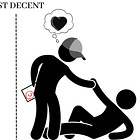When Quinn the Eskimo gets here
All the pigeons gonna run to him
If you’ve been paying any attention to my writing, you’ll be unsurprised to hear that I used to teach a college course on Bob Dylan. When I first floated the idea, colleagues cocked their eyebrows at me. This was before he won the Nobel Prize in Literature, so a few even scoffed. A lot of students figured it would be a cakewalk to an easy A. Little did they know, it was intensely rigorous, all the more so since it was aimed at juniors and seniors. No one coasted through my Dylan course.
So why bring up this course? I want to tell you about the final assignment. Instead of a soul-sucking exam (seriously, what kind of a sicko would dream up a test about Bob Dylan?), I had them write a short paper in response to the following prompt:
Encounters with powerful artists, whatever our views of their work, affect us in a variety of ways. Maybe they challenge our cultural assumptions, or maybe they affirm them. How has Bob Dylan and his work changed, challenged, or affirmed any of your previously-held assumptions? These assumptions do not have to be particularly profound or even significant, but you will have to argue your position thoroughly and persuasively.
Yes, I had them do an assumption audit, an evaluation of the ideas they readily embraced without conscious consideration. I gave them the assignment well in advance so that they could stew over it and to leave us time for an in-depth discussion about the meaning of the phrase “cultural assumptions.” After all, few people—particularly young college students— ever contemplate such things let alone audited them.
I can already hear some joker out there griping that my final assignment is the typical BS doled out by English professors. Typical, perhaps, but here’s the reality; it’s deceptively rigorous and demands a great deal of the students. Right from the start, it compels them to review the semester, but not in the rote way that a standard comprehensive exam would. My courses were way too hardcore for that pipsqueak stuff, which is often more about rigamarole than rigor.
Instead, they had to view the semester from a fresh angle while also questioning their core beliefs and values—probably for the first time in their lives.
Their performance had nothing to do with whether they loved or loathed Bob Dylan. A great paper? It had to show some high-level reasoning, particularly deft evaluatIon. Plus, it needed to dive deep into how they think about their own thinking—aka metacognition—which would help shift their perspective on the course material and force them to learn something about themselves. On top of that, they had to accomplish all this in a few pages of persuasive prose, meaning their papers had to be clear, concise, precise—in short, fluff-free. This, my friends, was one kick-ass little assignment.
Leaders Dash toward Disruption
What I pulled off with that assumption audit and I hope throughout my teaching career is what I am aiming to do right here in these essays for you. I am not big on step-by-step guides or spoon-fed information. That sort of thing is wonderful and useful, but I leave it to others. Instead, I am out to challenge you—my awesome audience—to see the familiar in a new light. It’s all about disrupting your assumptions and, just maybe, drilling into your core values. Perhaps you’ll get a gentle shake or a thrill ride or something in between. That's the idea, at least.
Any leader worth their salt, jumps at the chance to question their strongly held beliefs. Think about that. Leaders dash toward disruption. You may have heard people say that “leaders are comfortable with discomfort.” Nope. That is definitionally impossible. In fact, being a fantastic leader can be utterly unnerving. Leading, truly leading, means forever questioning and probing—especially yourself. A top-notch leader also challenges the people around them the same way and expects and encourages them to do the same back.
Leadership is hard—not rote-memorization-hard but Salvucci-final-assignment-hard. I’ve said it before, leadership ABCs are easy to grasp but tough to implement and maintain. Think about it. The most basic leadership doctrine of all is to just behave like a decent human being. That’s it. How difficult can that be? Well, judging by the dumpster fire that is bossdom out there, it must be well-nigh impossible!
So how can you up your leadership game? One way is to conduct regular assumption audits—formally or informally. What assumptions shape your decision-making? Probe and poke those beliefs. But here’s the kicker. Assumptions are slippery devils. They are those “truths” you cling to unawares. It’s impossible to identify them all, but it’s worth a shot. How else can you test them if you don’t even know they exist?
By the way, assumptions aren’t inherently bad. In fact, we need the vast majority of them just to cope with our reality. Otherwise, we’d be stuck pondering every silly decision: “Is the floor still solid, or am I better off just staying here in bed?” “Can I still drink the orange juice, or could it have turned to poison overnight?” Assumptions are handy and essential tools—that is until they fail. And, because assumptions exist beneath our awareness, a shattered one can be a painful and even damaging experience.
But What about George Costanza?
There is an episode of Seinfeld, where George accidentally plows into a flock of pigeons with his car on the street.
His girlfriend is horrified, but George can only rage that “we had a deal!” Jerry agrees with George that according to this unspoken deal, in exchange for pigeons getting out of our way, “we look the other way on the statue defecation.” Once that deal explodes in a flurry of feathers, though, it’s exposed as a mere assumption, which then puts George’s latest romantic relationship on the path of its doom.
So, as with my students and George (and maybe even the pigeons), the first step in confronting assumptions is to become aware of them. Not the small stuff about traffic flow or critter reactivity but the big assumptions about how life works and what really matters. Many of these assumptions you may recognize as self-limiting beliefs, those dead-wrong mantras that play in our brains and keep us down.
Once you have identified some major assumptions and limiting beliefs, it’s time to get to business. This is the meat of the assumption audit. Again, it doesn’t have to be a formal process, but you need to evaluate, then revise or eliminate, and finally start over. Only then can you truly grow. That’s what I offered my students, in my own little way—the opportunity to grow—and it’s what I hope to offer here.
Like so many other things worth doing, this assumption-audit business must be ongoing. And there’s no substitute. Frequently performing the assumption audit is key to self-assessment and ultimately success. Otherwise you’ll end up blaming the poor pigeons every time you mow them down. Just like George.
How often do you conduct formal or informal assumption audits? What assumptions do you make about yourself or the world that may be holding you back?
Part of leadership growth is gaining rigorous self-awareness, and I can help.
If you want to join the movement to guide young bosses to be the next generation of great leaders, visit GuidanceForGreatness.com.
Join the conversation by leaving a comment, and leave a like or review.
If you know someone who would be interested in this essay, please share it.
Thank you to all my subscribers! If you are not yet a subscriber, be sure to SUBSCRIBE to have On Leading with Greatness sent weekly to your inbox.
I look forward to hearing from you.















